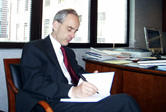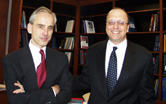Declaring a person brain dead is a necessary step to withdraw life support and allow for organ donation. But, Eelco F.M. Wijdicks, M.D., Ph.D., (pronounced ale-coe vadix) has found that the simple criteria for determining brain death has been widely expanded around the world. 
On Thursday, the Mayo Clinic neurologist — considered by many to be the foremost expert on brain death — shared the results of his yearlong, global survey on brain death criteria with the UNMC community. His visit was sponsored by neurological sciences, surgery and organ recovery.
“In the vast majority of countries there is an acceptance of brain death, but there are major differences in the procedures surrounding the examination,” Dr. Wijdicks said Thursday after UNMC’s surgical grand rounds. “There is a simple, precise definition for determining brain death, but it has been widely expanded over the years which might unnecessarily prolong the declaration of death and potentially jeopardize organ donation.”
The results of Dr. Wijdicks’ global survey appeared in the January issue of Neurology.
Dr. Wijdicks surveyed the brain death criteria in 80 countries around the world and found that many countries require more than one physician to declare someone brain dead. Some countries require the determination be made by a specialist, that there be confirmatory tests or that there be a 24-hour waiting period after the determination before life support is removed.
|
|
In the United States, the Uniform Declaration of Death Act (UDDA) is the basis for most brain death laws. The law includes testing for brain stem reflexes and breathing ability in deeply comatose patients with a catastrophic brain injury. Even so, some states, he said, have expanded the definition.
“Can you be sufficiently precise with one exam? Yes, you can,” Dr. Wijdicks said. “There is no need to believe you cannot. I believe there are unnecessary safeguards. You can still be methodical and precise and simple at the same time. There is no proof that expanding the definition has or would reduce errors.”
 Dr. Wijdicks, the author of several books including “Brain Death,” would like to see an international task force revisit the criteria in all countries.
Dr. Wijdicks, the author of several books including “Brain Death,” would like to see an international task force revisit the criteria in all countries.
Originally from Holland, Dr. Wijdicks has been at the Mayo Clinic for the past 10 years. His research interests are in intracranial hematoma, Guillain-Barre Syndrome and critical care neurology.
His recently published book “Brain Death” provides a wide perspective on the topic from legal, ethical, religious and philosophical aspects to clinical diagnoses in pediatric and adult patients. “Physicians involved with this are compassionate about making an accurate diagnosis,” he said. “Families also need to be aware that organ donation can save lives.”
Photos in descending order: 1) Dr. Wijdicks signs his book “Brain Death;” 2) Dr. Wijdicks with Pierre Fayad, M.D., chairman of neurological sciences at UNMC.